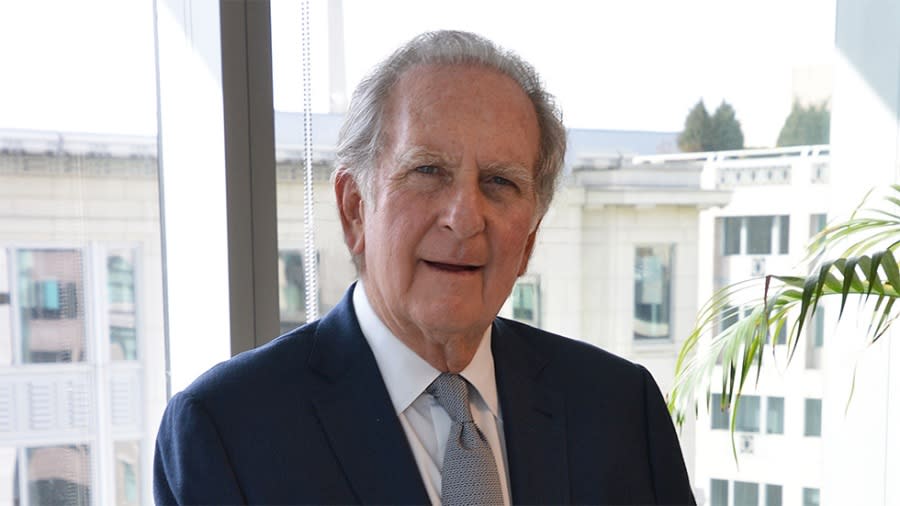Finding mile-high success in DC

Brownstein Hyatt Farber Schreck LLP seized the No. 1 spot among Washington lobbying firms last year, completing a meteoric rise for the Denver-based company that employed just a dozen lobbyists at the start of the century.
The firm’s chairman, Norm Brownstein, says his name is only listed first because he and his closest childhood friends drew straws. It was those friends, Steve Farber and Jack Hyatt, who helped Brownstein overcome tragedy after he lost his mother at age 12 and moved into a foster home shortly after.
He vividly remembers walking to his Denver home after school with Farber and Hyatt only to find that another family was living in it.
“I went to unlock my door and a stranger came out and said, ‘You don’t live here anymore. We closed on this house today and we’re living here,’ ” Brownstein recalled in a recent interview.
Farber convinced his parents to let Brownstein sleep on a mattress in their basement. He stayed there for several weeks until he located his father, who had sold the house, and later went into foster care.
Brownstein’s life turned around when a Denver foster family — a 24- and 25-year-old couple who already had three young kids of their own — took him under their wing. He lived with them from age 14 all the way until he got his law degree from the University of Colorado.
“The luckiest thing that ever happened to me was going to this foster family, because I had kind of lost my way,” Brownstein said. “It was just the conversations you had at dinner, how they cared about your nutrition, how they cared about how you did in school, your future. Those were things that I wasn’t focusing on.”
Following brief stints at law firms, Brownstein and his childhood friends launched their own Denver firm in 1968. They focused on real estate — an area that was underserved by major firms at the time — and slowly but surely gained national recognition.
Brownstein didn’t engage with Washington until the 1980s, when he centered his lobbying efforts around bolstering the U.S.-Israel relationship, a passion of his that helped him form relationships with Democrats and Republicans who would later become influential leaders.
Brownstein was met with skepticism when he launched a D.C. office in 1995. Several of the top lobbyists at the time urged him to instead join their firms, warning that he would never find success while continuing to work from Denver.
It’s unusual for any Washington lobbyist to live far from the nation’s capital, where K Street insiders regularly throw parties and fundraisers for prominent policymakers in an attempt to make inroads.
Brownstein nevertheless sought to build lasting relationships with lawmakers that involved hours-long conversations about key issues and everyday life. When he wasn’t traveling to Washington, Brownstein would fly lawmakers and clients out to Denver and give them a tour of his office, trips that sometimes ended with Brownstein personally driving them back to the airport.
In 2003, every single senator signed a photograph of the upper chamber for Brownstein with the words “our 101st senator” inscribed on it.
But despite the widespread acclaim, Brownstein’s firm was for years relatively tiny, with its annual lobbying revenue routinely being dwarfed by its larger competitors.
A key turning point came in 2008, when Farber raised significant corporate funds to bring the Democratic National Convention to Denver. The firm capitalized on the opportunity, hosting a 2,000-person party at the Denver Art Museum that attracted more than 30 members of Congress and holding receptions every night for potential Obama Cabinet members.
“That really put us on the map, despite our size, as a heavyweight that could compete with the other firms who were deemed in Washington circles to be the top tier of Democratic politics,” said Al Mottur, a shareholder at Brownstein and a Democratic fundraiser who was the firm’s managing partner at the time.
In the first year of the Obama administration, the firm’s lobbying revenue shot up by 58 percent, placing Brownstein among the top five lobbying firms for the first time.
The firm’s profits jumped again during the Trump administration and skyrocketed after the COVID-19 outbreak prompted companies to lobby for government aid and federal contracts to fight the pandemic.
“When the pandemic broke out, Norm insisted that all of the firm’s lawyers and lobbyists join a call three times a week … he was able to keep us connected in a way that helped guide us through what became the most successful run in the firm’s history,” said Marc Lampkin, the managing partner of Brownstein’s Washington office and a GOP fundraiser.
The firm raked in nearly $56 million in lobbying revenue last year, the largest ever single-year haul for a lobbying firm, according to research group OpenSecrets. Brownstein now fields a roster of more than 70 registered lobbyists, including former senators, Cabinet officials and chiefs of staff to prominent lawmakers.
Brownstein estimates that over the course of his career, his firm has guided through the passage of nearly two dozen bills that were signed into law. He points to numerous corporate tax overhauls and provisions passed during the financial crisis to boost the housing industry and allow struggling corporate giants to restructure their debt.
He’s perhaps most proud of his successful pro bono lobbying effort to substantially increase funding for melanoma and prostate cancer research and helping guide tens of millions of dollars in grants to the University of Colorado and other nonprofits in the state.
Brownstein is the final remaining co-founder of the firm, after Hyatt died in 2017 and Farber passed away in 2020.
“I don’t see myself retiring,” he said. “I see myself taking more trips, more time off, but I’m always going to be involved, and I’m always going to be there for clients to talk to whether I’m lobbying or not.”
For the latest news, weather, sports, and streaming video, head to The Hill.

